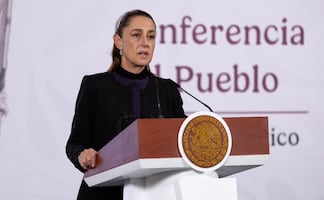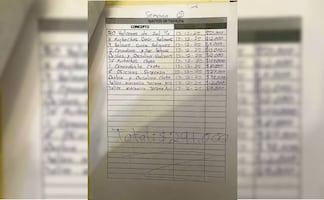Más Información

Narco “La Rana”, entre altar a la muerte, corridos de Los Rayos del Norte, drogas y armas doradas; EU difunde foto de como vivía

Sheinbaum ajusta horario de conferencia mañanera este 26 de febrero; se realizará desde Mazatlán, Sinaloa

Ellos son “La Rana” y “Aquiles”, hermanos Arzate-García, jefes del Cártel de Sinaloa; EU los busca por narcoterrorismo
Building a wall along the U.S.- Mexico border has been a contentious subject in this year’s U.S. presidential election.
In parts of California and Arizona, a wall already exists.
It runs across rocky deserts, flowing sand dunes and miles of agricultural land. The wall splits towns and families, marking a boundary between two countries that used to be one. Busy land ports of entry and signs written in both Spanish and English attest to an interdependence that still exists in the bifurcated cities, faded mining towns and eccentric art outposts that punctuate the arid landscape.
The border between Mexico and the United States spans some 2,000 miles between San Diego, California and Brownsville, Texas.
Monitored around the clock with ground sensors, cameras and hundreds of customs and border patrol officers, the wall is composed of a mash-up of materials: formidable cement slabs, steel mesh, rusty corrugated metal.
There are oddities along the fence: a home surrounded by life-sized space alien mannequins and toy UFOs; the statue of a cow mounted high above the ground near a cattle ranch; and gaps in the fence occur sporadically without explanation.
A man rode a tricycle in a small California border town past a grocery store with a one percent sign hanging on the wall.
In Nogales, Arizona's largest international border community, the wall neatly divides the city. Little else distinguishes the hillside homes stacked on either side. Drivers entering Mexico are warned by a sign that firearms and ammunition are prohibited. At night, a bright neon yellow McDonald's sign stands out.
Some who live near the border in California and Arizona agree with U.S. Republican presidential candidate Donald Trump and his demand that Mexico pay the cost for construction of a wall on the border between the two countries. Others are deeply disturbed by it, like Mexico's government.
"It's been stigmatized pretty bad," said Jaime Alvarez, a retired Army auditor running for Arizona Senate. He works out of the Democratic party office in the city of Douglas.
Alvarez said residents are worried that too much talk about border control will distract people from having other important discussions about education, poverty and healthcare.
Noticias según tus intereses
[Publicidad]
[Publicidad]











